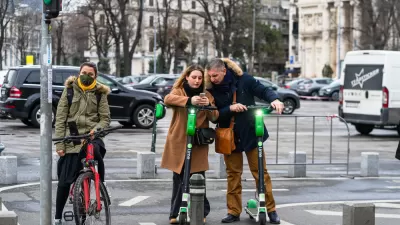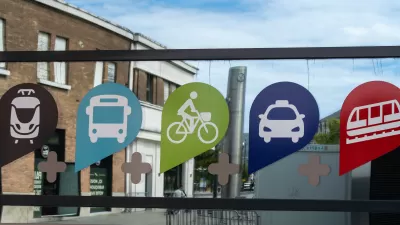A highly anticipated analysis of public health outcomes caused by the proliferation of electric scooters has been released. Most of the reported are considered preventable.

Sarah Holder reports that the Centers for Disease Control and Prevention (CDC) recently released a report on the public health threats posed by electric scooters, focusing on the preventability of many of the injuries suffered by scooter riders since they began hitting streets within the last year-plus.
Holder explains the circumstances that led to the study:
The CDC began studying the public health impacts of dockless electric scooters soon after the tiny contraptions arrived on the streets of Austin, Texas, in April of 2018. The city’s transportation and public health agencies quickly noticed that a lot of people seemed to be falling off the vehicles, so they requested support to study the problem. The CDC sent four researchers to help launch the first epidemiological investigation into the safety of the micromobility revolution. In the 87-day study period, the CDC and Austin’s Public Health agency identified 271 riders with potential e-scooter-accident-related injuries, and interviewed more than half of them.
According to the study's findings from Austin, 45 percent of the injuries suffered by scooter users were head injuries, and 15 percent of those were "traumatic head injuries."
"For every 100,000 trips taken, 20 individuals were injured," adds Holden to the findings shared and expounded upon in the article. Inexperience played a role in many of the injuries, as did road conditions. Interestingly, only 16 percent of the incidents counted in this study were involved cars or trucks.
FULL STORY: Scooters Wouldn’t Be So Dangerous If You Just Wore a Helmet

Planetizen Federal Action Tracker
A weekly monitor of how Trump’s orders and actions are impacting planners and planning in America.

Congressman Proposes Bill to Rename DC Metro “Trump Train”
The Make Autorail Great Again Act would withhold federal funding to the system until the Washington Metropolitan Area Transit Authority (WMATA), rebrands as the Washington Metropolitan Authority for Greater Access (WMAGA).

The Simple Legislative Tool Transforming Vacant Downtowns
In California, Michigan and Georgia, an easy win is bringing dollars — and delight — back to city centers.

The States Losing Rural Delivery Rooms at an Alarming Pace
In some states, as few as 9% of rural hospitals still deliver babies. As a result, rising pre-term births, no adequate pre-term care and "harrowing" close calls are a growing reality.

The Small South Asian Republic Going all in on EVs
Thanks to one simple policy change less than five years ago, 65% of new cars in this Himalayan country are now electric.

DC Backpedals on Bike Lane Protection, Swaps Barriers for Paint
Citing aesthetic concerns, the city is removing the concrete barriers and flexposts that once separated Arizona Avenue cyclists from motor vehicles.
Urban Design for Planners 1: Software Tools
This six-course series explores essential urban design concepts using open source software and equips planners with the tools they need to participate fully in the urban design process.
Planning for Universal Design
Learn the tools for implementing Universal Design in planning regulations.
Smith Gee Studio
City of Charlotte
City of Camden Redevelopment Agency
City of Astoria
Transportation Research & Education Center (TREC) at Portland State University
US High Speed Rail Association
City of Camden Redevelopment Agency
Municipality of Princeton (NJ)





























